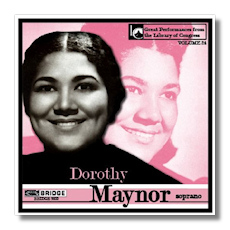
The Internet's Premier Classical Music Source
Related Links
- Latest Reviews
- More Reviews
-
By Composer
-
Collections
DVD & Blu-ray
Books
Concert Reviews
Articles/Interviews
Software
Audio
Search Amazon
Recommended Links
Site News
 CD Review
CD Review
Library Of Congress Recital

- George Frideric Handel: Semele: O sleep, why dost thou leave me?
- Ludwig van Beethoven:
- Der Kuss
- Adelaide
- Robert Schumann: Du bist wie eine Blume
- Johannes Brahms: Meine Liebe ist grün
- Richard Strauss:
- Wiegenlied
- Wie sollten wir geheim sie halten
- Franz Schubert: Ave Maria
- Claude Debussy: Beau soir
- Georges Bizet: Adieux de l'hôtesse arabe
- Gustave Charpentier: Louise: Depuis le jour
- Gabriel Grovlez: Guitares et mandolines
- R. Nathaniel Dett: My Day
- Samuel Coleridge-Taylor:
- She Rested by the Broken Brook
- Thou Art Risen, My Beloved
- Cecil Cohen: Epitaph for a poet
- Spirituals:
- Lead me to the water (arr. William Lawrence)
- I'm seekin' for a city (arr. Ernest Hayes)
- I'm goin' to tell God all my troubles (arr. R. Nathaniel Dett)
- Ride on, Jesus (arr. R. Nathaniel Dett)
- Ev'ry time I feel the spirit (arr. R. Nathaniel Dett)
- Were you there
Dorothy Maynor, soprano
Arpad Sandor, piano
Bridge 9233 ADD mono 67:44
This is Volume 24 (!) in Bridge's "Great Performances from the Library of Congress" series. It is particularly welcome, as Maynor did not make many studio recordings. (In fact, I believe they would fit on a single CD.) Furthermore, Maynor's complete studio recordings have not been reissued on CD, although her famous Victor recording of "Depuis le jour" is occasionally anthologized.
Born in 1910, Maynor lived during a time when the color bar was operating at full-strength. Many Americans were not ready to accept that an African-American woman had anything significant to offer in the classical repertoire. I still remember reading, when I was in my teens, a guide to 78 rpm records that was published in the 1940s. The author, whose name is still familiar among record aficionados, grudgingly admitted that Maynor's "Depuis le jour" was beautiful, but what identification could she possibly have with Charpentier's rapturous seamstress? (Who would think of asking what identification Pavarotti could have had with an impecunious Parisian poet, or Ezio Pinza, a former bicycle racer, with Boris Godunov?) To give him the benefit of the doubt, perhaps he was referring to the singer's short stature and "heroic" physique, but still… .
The quality of her voice was recognized early on, but it took some time before she was convinced that she could have a career as a soloist. Her big break came in 1939, when she was heard by Serge Koussevitzky, who called her "a musical revelation." This Library of Congress recital, preserved here in full, took place in December 1940. Maynor's career as a singer appears to have been fairly short. She retired from singing when her husband, Rev. Shelby Rooks, became ill. Again, as a black woman, her opportunities at that time were limited anyway. In 1963, she founded the Harlem School for the Arts, a project certainly no less worthy of praise than her talents as a singer. Maynor passed away in 1996.
Hearing this CD, no one should doubt that Maynor was a great singer. Her interpretations are always intelligent and heartfelt, and the voice, while apparently not a large one, frequently is of an astonishing beauty. It's no accident that "Depuis le jour" became her signature piece because in it, her voice soars rapturously from note to note, like a swallow riding the evening breezes. The high notes, perfectly placed, float like one of those pink cumulus clouds one sometimes can admire as the summer sun goes down. Granted, her voice was not infallible. Some of her loud high notes could take on an unpleasant edge or lose their center, and from register to register, the different parts of her voice did not seem to be well integrated. I don't doubt that these minor faults could have been ironed out, had she begun serious studies as a solo singer earlier in her life. One wonders how long her voice would have held up, though, had she continued singing.
The audience is a crucial part of this recital too. At times they seem awed by what they are hearing, and at other times, they don't even wait for Arpad Sandor, Maynor's accompanist, to stop playing before they begin applauding. The booklet annotator tells us that after Were You There, the final encore, there was more than a minute of silence before the audience erupted into applause and cheers. Of course that minute has not been preserved on this CD, but you can feel it there, almost like a phantom limb.
This program once was on one of the Library of Congress's own CDs, so if you have that one, you probably don't need to replace it with Bridge's release. In 1940, the Library of Congress staff recorded the recital on acetate discs, and those are what were used, apparently, for both releases. For a live recital from that era, the sound is pretty good – not much worse than what one might have gotten under studio conditions. Bridge's release contains an essay about Maynor, plus texts, translations, and commentary about the individual items. It's gratifying to know that Maynor's legacy is being taken seriously, in spite of the many naysayers she must have encountered during the 1940s.
Copyright © 2007, Raymond Tuttle




















